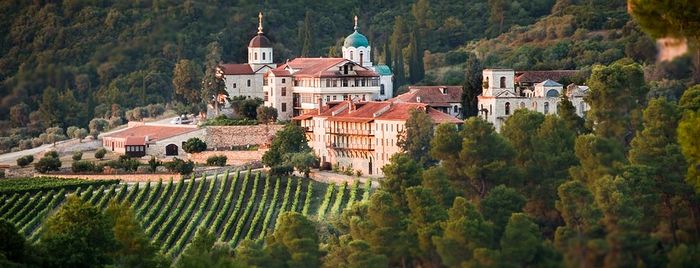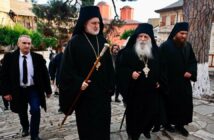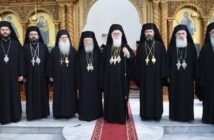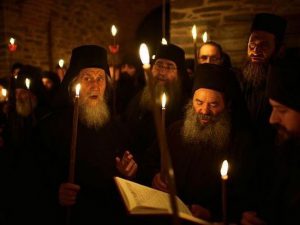 Source: Pravoslavie.ru
Source: Pravoslavie.ru
Athonite monasticism has always stood on guard for the purity of Orthodoxy. Athonites have actively participated in the work of Church councils and came out against the unions of Lyons and Florence. Ecumenical contacts have repeatedly come under criticism from Athonites (letters to the Ecumenical Patriarchate, proclamations, reports of the Holy Kinot), however most Athonite monks throughout the whole history of the Holy Mountain have avoided zealous demonstrations and indiscriminate criticisms of the hierarchy. With filial respect and love and veneration Athonites have expressed their opinions, suggestions, and warnings, even ready, when danger hung over Orthodoxy, to go to their martyrdoms but not to change their convictions.
The Holy Mountain awaits the Pan-Orthodox Council with careful attention. On Athos they pray and hope that its participants will remain within the bounds of Orthodox Tradition, previously outlined by the Ecumenical Councils and Church Tradition.
A limited number of Athonites have unconditionally supported the Council. Of these only the well-known theologian and ecclesial author Archimandrite Vasileios (Gontikakis) of Iveron has openly declared his position. February 3, 2016 Fr. Vasileios published an extensive theological article “On the Great Council of the Orthodox Church.” In this publication he emphasized the inseparable connection of the Church with the mystery of Pentecost and critically replied to the “superficial ecumenists and fanatical zealots,” who are “prisoners of one and the same prison. They are withdrawn into only their own view, deprived of the boldness of faith and love of truth.”
Archimandrite Vasileios has taken part in a number of international conferences in support of the impending Pan-Orthodox Council, in particular, in the Symposium “On the Eve of the Holy and Great Council of the Orthodox Council” on the island of Crete (May 15-16, 2016). In his reports Fr. Vasileios emphasized that the decisions of the Councils of the Orthodox Church should be accepted not by men, but “in the Holy Spirit.” “Whether a council becomes ecumenical or not depends not on the decisions of men, but is the fruit of the living ecclesial consciousness in the Spirit, which infallibly bears the judgments of every Council and theologian.”
Not taking into account the position of the zealots of the old brotherhood of Esphigmenou and a few Athonite kellis that are outside of eucharistic communion with the Orthodox Church, in the first phase regarding the Pan-Orthodox Council only a few individual Athonite monks spoke out.
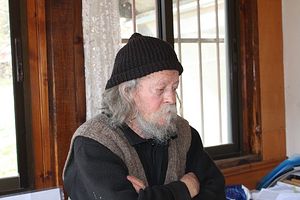
Elder Gabriel
The renowned Athonite elders Gabriel of Karyes and John Papagiannis spoke out against the Holy and Great Council on Crete. The “Open letter of Athonite fathers to the Ecumenical Patriarchate and other autocephalous Orthodox Churches, to the Holy Kinot of the Holy Mountain, and to the fullness of the Christian Church” with criticisms of the Pan-Orthodox Council was signed also by only a few monks of the kellis and members of the council of elders of the Great Lavra of St. Savvas. These last actively defended their position in the Greek and foreign media.On April 24, 2016 an open letter of six Athonite monasteries was disclosed to the Holy Kinot of the Holy Mountain. The monasteries of Koutloumousiou, Xeropotamou, Zografou,Karakallou, Philotheou, and Grigoriou criticized the documents adopted at the meeting of the primates of the Local Orthodox Churches in Chambesy January 21-28, 2016, especially the document “Relations of the Orthodox Church with the Rest of the Christian World.”
The Athonite fathers in writing expressed their alarm and anxiety regarding the Pan-Orthodox Council and their urgent request to bring the documents into discussion at the meeting of the representatives and abbots of the Athonite monasteries on the feast of the Resurrection of Christ.
In a letter of the Holy Monastery of Karakallou (March 3, 2016) is particularly said: “As emerges from the study of the pre-approved texts, the statements made with regard to ecclesiological issues are precarious and ambiguous and allow for interpretations which divert from Orthodox dogma. Likewise, in the text under discussion it is stated that the decisions of the Synod will be binding for the full body of the Church—something which impinges upon the Orthodox conscience.”
In the message of Xeropotamou Monastery it is emphasized that “The calling of the Pan-Orthodox Council … in light of the now already-existing barefaced mystery of lawlessness (2 Thess. 2:7), may truly have historical value, if it can show in today’s confusion and impenetrable darkness the one Truth, the one, true Light of our Lord Jesus Christ.”
Meanwhile Archimandrite Joseph, the abbot of the Holy Monastery of Xeropotamou, and the brothers did not conceal their “uneasiness,” recalling that “the great history of the Church itself undoubtedly witnesses that not every council of bishops safeguards the truth, or is foreign to all fallacies.” Having studied the document on the relations of the Orthodox Church with the rest of the Christian world, the inhabitants of Xeropotamou expressed their belief that “by all that is written and implied in the above-mentioned documents … the ideologues and composers have undertaken legal justification for Christian syncretism-ecumenism as one of the decisions of the Pan-Orthodox Council.”
In the message of Grigoriou Monastery is underlined that the main problem of the document “Relations of the Orthodox Church with the rest of the Christian World” is the “vague use of the term ‘Church.’” In the opinion of the Grigoriou brothers, the Orthodox Church contains the entire fullness of truth, while the heterodox have usurped the title and properties of the One, Holy, Catholic and Apostolic Church. Thus it is necessary to introduce changes into the text so that those dwelling outside the barriers of the Orthodox Church will not get the impression “that there is no need to look for a path of return to the bosom of the ‘One, Holy, Catholic, and Apostolic Church—the Orthodox Church.’”
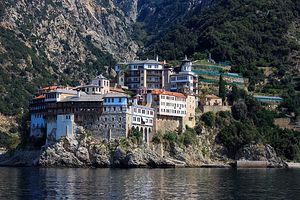
Grigoriou Monastery
The text of the pre-conciliar document “The Mystery of Marriage and its Impediments,” according to the brethren of Grigoriou, contains a position of regularizing the “theologically incorrect ‘baptismal theology.’” In the question of “mixed marriages with the heterodox” the brotherhood of Grigoriou urged not to accept innovations, but to follow the sacred canons of the Orthodox Church.
The document “The Mission of the Orthodox Church in the Modern World” is also subject to criticism in the letter of Grigoriou. The brothers of the monastery expressed their conviction that in this question it’s necessary to maintain a boundary between the position of the Orthodox Church and the heterodox “churches” and also criticized some mistaken modern theological theories about human personhood which are reflected in this document.Besides the message to the Holy Kinot, the brotherhood of Grigoriou composed an extensive text, “Comments and Proposals for the Documents of the Holy and Great Council” with detailed amendments and additions, “in order to avoid an erroneous witness to the Orthodox Church.” The text was translated into several languages by the initiative of the brothers and was circulated online.
The brothers of Philotheou Monastery expressed their “confusion as to the purpose of calling the Council in such trying times” in their own letter. Omitting the remaining topics for discussion at the Council, they concentrated on critiques of the document “Relations of the Orthodox Church with the rest of the Christian World.” The inhabitants of Philotheou expressed hope that the Council will manage to avoid any form of recognition of the heterodox as Churches.
In the letter of Koutloumousiou Monastery (March 26, 2016) is emphasized “the extraordinary importance of the impending council for the future of the Orthodox world.” On this the brothers made a number of comments concerning the texts proposed for discussion at the Pan-Orthodox Council (in them “besides many positive points … there arises also questions concerning the theological content of Patristic tradition.”)
The monks of the Athonite monastery expressed their belief that the upcoming council reminds of rather “a meeting of the Primates, and not a Pan-Orthodox Council.” Giving the right to vote only to the Church Primates and the participation of a limited number of bishops from every Local Orthodox Church “unwillingly promotes the permeation of the theology of primacy which is a continuation of the theology of personhood which appeared in the twentieth century.”
Commenting on the prospects of interfaith dialogue, the brothers of Koutloumousiou called it “incoherent” for the “One, Holy, Catholic and Apostolic Church to confess the existence of other Christian churches.”
In their letter Koutloumousiou highlighted that “the fullness of the Church expects that the upcoming Council will not ignore the decisions of the councils held with the participation of St. Photios and St. Gregory Palamas … If this isn’t done it will be demonstrated that the Orthodox Church doesn’t accept theology since the Seventh Ecumenical Council.”
Also, the brothers of Koutloumousiou spoke about the “misapprehension about the appropriateness of the presence at the Pan-Orthodox Council of heterodox observers.”
In the final section of the letter it is written: “The fullness of the Church expects that the Holy and Great Council will become a genuine expression of Tradition. At the same time, authoritative voices continue to come from all sides which reinforce the trepidation that some decisions will cause bigger or smaller problems and possibly lead to a schism.”
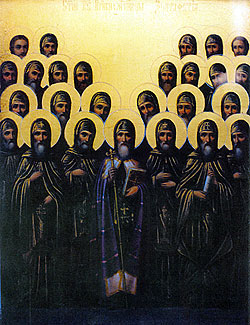
26 Martyrs of Zografou, burned alive by Catholic Crusaders
In the beginning of their letter to the Holy Kinot the brotherhood of Zografou Monastery reported that they “carefully studied” the documents prepared for adoption at the Pan-Orthodox Council, and expressed their “considerations and concerns.”In particular, the Athonite monks expressed their disagreement with the fact that at the Council there will not be the possibility of “introducing changes into the documents adopted at the pre-conciliar meetings.”
“The consistent one-sidedness of the text” of the document “Relations of the Orthodox Church with the rest of the Christian World,” according to the beliefs of the Zografou brotherhood “creates the impression of premeditation: the composers of the text tried to ‘appease’ the so-called ‘churches and confessions,’ that is, those existing outside the One and only Church.”
“Of course, this gives rise to unclear formulations and terminological confusion and radical divergence from the direction in which the Orthodox Church has marched for two thousand years, at their official meetings laying down the border between truth and error which preserves their flocks from the danger of various heretical teachings.” Conversely, in the document “Relations of the Orthodox Church with the rest of the Christian World” the “term ‘Church’ is confused with various Christian communities, also called in this text ‘churches.’”
The Zografou brothers believe that such one-sidedness occurs in the text and in the evaluation of the bilateral dialogues of the Orthodox Church and other Christian confessions, while most confess their ‘complete failure.’”
The Athonite monks emphasize that “the excessive steps towards a meeting with the heterodox increases the number of Orthodox believers who depart to various zealot groups and formations. Paradoxically, efforts to enter into dialogue with those who are so close to the Church are not undertaken, but all strength is directed towards rapprochement with those far away.”
According to some commentators, their proposals for revising the documents of the Pan-Orthodox Council at the meeting of the Holy Kinot were sent to other Athonite monasteries (but for various reasons were not public). In any case, discussion of the documents took place, and the fruit of the discussion was the final document, signed by representatives of every Athonite monastery.
The letter was addressed to Patriarch Bartholomew of Constantinople; also, in accordance with the decision of the Holy Kinot, copies of the letter were delivered to every Local Church. The Athonites emphasized that “they are diligently praying,” that the Lord would “bless and direct on the right path this most important work of the Holy and Great Council for the benefit of His Church.” They also noted that “some provisions of the texts presented for the Council require clarification” and humbly presented “their proposals to the judgement and evaluation of the Church.”
In the letter it is emphasized that the term “Church” is acceptably used only in reference to the Orthodox Church; the heterodox should be defined as “Christian teachings and confessions.” According to the Holy Kinot “the meaning of the unity of the Church is in need of elucidation … In the unity of the Church is found only the members of the Orthodox Church, the Body of Christ … Only to them can be attributed the words that they may be one, as We are One.
In this regard they proposed to change the expression in paragraph five of the document “Relations of the Orthodox Church with the rest of the Orthodox World:” “the search for the lost unity of Christians” to: “the return to the truth of those Christians who have removed themselves from the Church.”
The Athonites also expressed their disagreement with the way dialogue is carried out between the Orthodox Church and the heterodox: “The Holy Kinot more than once and in various circumstances has officially spoken out against the theological agreements with the heterodox, and protested against common prayers and liturgical celebrations (kissing, and so on).”
The Holy Mountain underlined that the criterion of the truth of the faith is “the conscience of the fullness of the Church,” which can be expressed by individual people, not only by Councils.
The Athonite monks expressed certainty over the necessity of mentioning in the documents of the Pan-Orthodox Council the Councils of St. Photios the Great (879) and St. Gregory Palamas (1341 and 1351), as they clearly demonstrated the “dogmatic and ecclesiological discrepancies with the heterodox (Filioque, created grace, papal primacy).”
Additionally, the Holy Mountain proposed to include in the document “The Mission of the Orthodox Church in the Modern World” a detailed reference to Orthodox anthropology and cosmology (based on the teaching of St. Gregory Palamas).
In the final section of the letter the Athonite monks point to the necessity of “correcting the texts of the pre-conciliar documents,” so that they would express the beliefs of the entire fullness of the Church and not become an occasion for schism and division, “and that all the fullness of the Church ‘with one mouth and one heart’ would praise the All-Holy Triune God as the hope and salvation of the whole world.”
